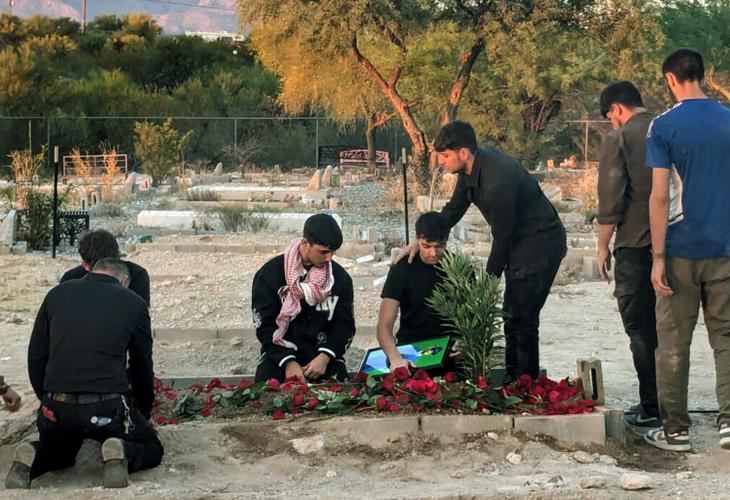A bed of red roses covers Minhaj Jamshidi’s grave. Family and loved ones surround it Wednesday evening, kneeling and sobbing in each other’s arms.
The 19-year-old Pima Community College student was shot and killed Sunday night, when a dispute escalated to a deadly end during a pickup volleyball game outside a dorm on the University of Arizona campus.
Three days after his death, Jamshidi’s family, encircled by a crowd of more than 50 mourners at the All Faiths Cemeteries on Tucson’s far east side, bury Jamshidi amid prayers and chants of mourning, a visible display of community solidarity.

Mourners gather around the grave of Minhaj Jamshidi Wednesday evening at All Faiths Cemetery in Tucson. The 19-year-old Pima College student was shot and killed Sunday night during a dispute at a volleyball game on the University of Arizona campus.
“May Allah make his grave paradise. Allah will reward him with jannat (paradise),” an elderly mourner shouts into the crowd at the cemetery.
Before the funeral procession to the cemetery, mourners first gather at the Islamic Center of Tucson near the UA campus to pray for Jamshidi, who is survived by his parents, two sisters and one brother. Chants of “Allahu Akbar,” a phrase said during times of distress as well as joy which means “God is great” or “God is greatest,” fill the mosque.
The mourners, divided into men who gather in the main hall of the mosque and women who pray in an adjacent room, are first addressed by Muhammad Zaki, a board member and outreach coordinator at the Islamic Center. Zaki declares Jamshidi was returned to Allah “as a shahid,” a martyr, “as he was taken in an unjust manner.”
Zaki’s address is followed by a prayer, as the crowd in a hall stands closely together. They bow down, kneel down and come back to a standing position, repeating this cycle numerous times while chanting “Allahu Akbar.”
Just as the mourning begins at the Islamic Center, the suspect in Jamshidi’s killing, Ryan Romero-Encinas, is arrested by police, more than 48 hours after the death.
“I feel like they need more security in the UofA, because how was he (the shooter) holding a gun the whole time at night? It does not make sense,” says Muhammad Al-Hajjar, 15, Jamshidi’s best friend of many years. “He (would) be alive right now if they had more security.”

Mourners gather around the grave of 19-year-old Minhaj Jamshidi Wednesday evening at All Faiths Cemetery in Tucson. “May Allah make his grave paradise," one mourner cried out.
Upon reaching the cemetery, the funeral procession gathers at the burial ground, the crowd divided into men and women. The men take shovels to the ground while the women wait with roses in hand and hold onto each other, sobbing silently.
“We had a brotherhood. We play soccer together, we play everything together,” says a friend of Jamshidi’s. “He was a very kind person, he was always smiling. Right now, I feel like he’s smiling right (in front of) my face. He was a very, very whole person. Everyone loved him.”
Members of the Catalina High School community, including Jamshidi’s two wrestling coaches when he was a student there, also mourn at the memorial service.
“I’ve been in education for almost 30 years, and Minhaj has always been one of the most positive, upbeat kids ever,” says Michael Beck, assistant principal at Catalina and Jamshidi’s former coach. “He was strong, he was determined. Everything he did, he gave 100% effort on.”
Ben Clevenger, 46, Jamshidi’s wrestling coach of three years, calls Jamshidi an “amazing personality” and “larger than life.” Clevenger, breaking into sobs, describes Jamshidi’s ability to “make everyone around him better,” saying Jamshidi “made me a better coach.”

Ben Clevenger, Minhaj Jamshidi's former wrestling coach at Catalina High School, stands with holy offerings in hand at the burial service Wednesday evening.
“She just wants justice,” says Qais Papoutsis, translating for Jamshidi’s mother, Khalida. Papoutsis was Jamshidi’s employer at Opa Best Greek American Cuisine.
“(Minhaj) was her everything, (he) was her first son. Everywhere she sees, she would see him with a beautiful smile,” Papoutsis says. “He was happy all the time (and would) keep everybody happy.”
Once Jamshidi’s body is placed into its burial space, sand and rocks are shoveled back onto it. The women follow, placing the red roses on top of the fresh grave.

Mourners hold photos of Minhaj Jamshidi Wednesday evening at Tucson's All Faiths Cemetery. One of the photos is of Jamshidi's graduation this spring from Catalina High School.
“I’ve always said that a parent should never have to bury their child,” says Beck, the former coach. “It’s probably the most tragic thing when you lose somebody so young, so early in their life, when they haven’t had a chance to live their life yet.”







